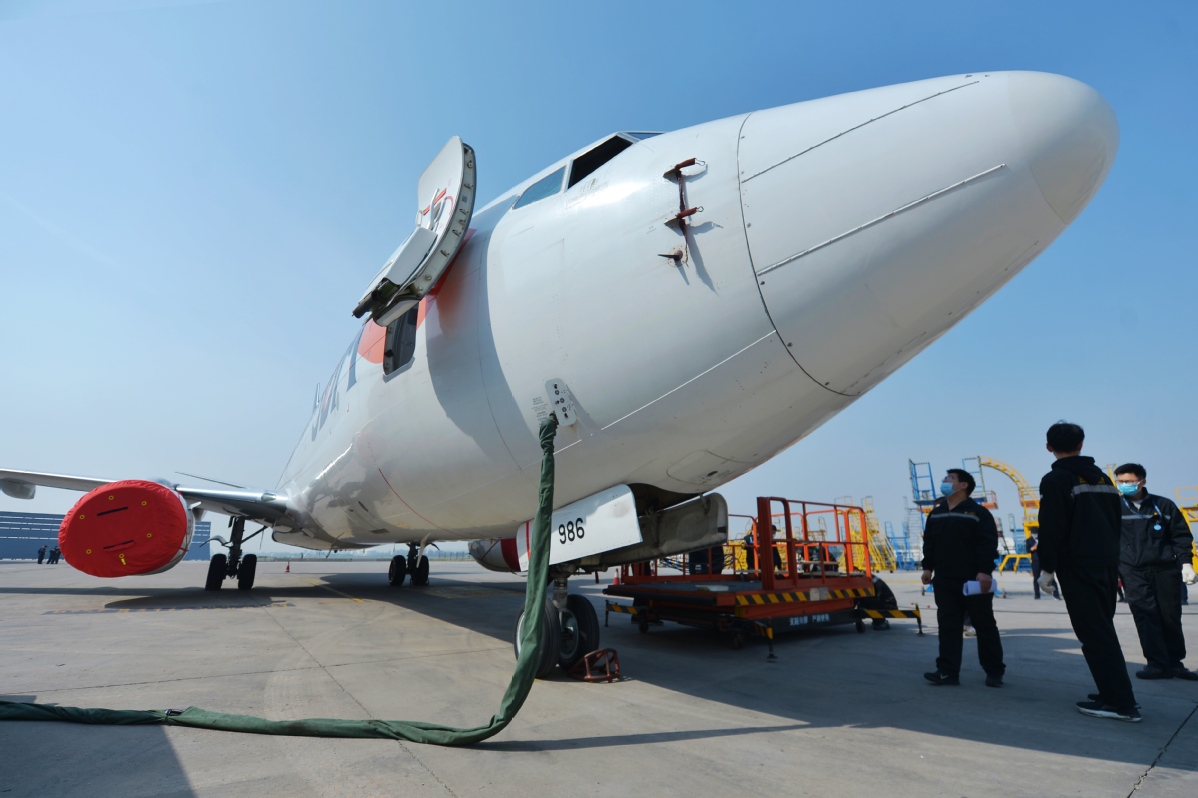Air cargo sector playing key role in global recovery
By Zhu Wenqian | China Daily | Updated: 2020-06-18 10:16

Domestic, foreign carriers get subsidies to build better freight capability in China
Air cargo is playing an increasingly important role in the fight against COVID-19, as a substantial number of passenger aircraft have been grounded due to the pandemic.
Cargo flights have been growing in number and frequency between China and 84 international destinations in 51 nations and regions, according to VariFlight, a Chinese aviation data and solutions services provider.
In May, the number of outbound cargo flights from the Chinese mainland reached 4,910, surging 113.66 percent year-on-year. The number of inbound cargo flights to the Chinese mainland came in at 4,383, jumping 93.42 percent year-on-year, said VariFlight. The data only counted designated freighters and didn't include cargo aircraft that have been converted from passenger aircraft.
In late May, the Ministry of Finance and the Civil Aviation Administration of China, or CAAC, said it will provide financial support for both Chinese and foreign carriers who carry out cargo deliveries using commercial aircraft in order to cushion them from the COVID-19 impact.
Airlines can receive 80 percent compensation for costs involved in converting passenger aircraft into freighters, and they will receive financial incentives for flying international cargo flights between April 1 and June 30.
"The policy itself is more symbolic than substantive. Although the cost compensation can hardly make up for the loss in passenger flights, the measures are sending signals that the government supports airlines' international cargo operations. The supportive measures will help streamline and strengthen global freight transport capacity," said Lin Zhijie, an aviation industry analyst.
"The policy will grant subsidies to both domestic and foreign carriers as it requires the efforts of airlines both at home and abroad to build better freight capability in China," said Lin, who is also a columnist at carnoc.com, one of China's biggest civil aviation websites.
"At this stage, international cargo flights are more profitable. Even if there is no subsidy, carriers will actively carry out cargo flights and convert their commercial aircraft to freighters," he said.
Meanwhile, China's domestic air travel market is gradually picking up after being ravaged for months by the COVID-19 pandemic.
In May, 25.8 million people traveled by air both domestically and overseas, down 52.6 percent year-on-year, while the decline was 15.9 percentage points less than that recorded in April. The transportation volume by freighters reached 228,000 metric tons, growing 21.8 percent year-on-year, according to CAAC.
Eastern Air Logistics Co, the freight unit of Shanghai-based China Eastern Airlines, will convert 14 wide-body passenger aircraft into cargo carriers, thus creating the largest passenger aircraft-converted wide-body fleet in the domestic market.
Chengdu, Sichuan province-based Sichuan Airlines has adjusted its flight networks by reducing or suspending flights with low revenues, and added more flights with higher yields.
In the first four months, sales revenues at Sichuan Airlines were only 30 percent of the amount recorded a year earlier. At its worst point during the novel coronavirus pandemic, the carrier suffered reduced revenue of 70 million yuan ($9.88 million) daily, the company said.
Prior to the outbreak of the contagion, it had three Airbus A330 freighters. Since the outbreak, the carrying capacity of the three freighters was saturated. It then retrofitted eight existing passenger aircraft into cargo freighters, and thus improved capacity and increased revenue.
"So far, our cargo flight networks have covered Southeast Asia, Europe, North America and the Middle East. Sales revenue of the 11 freighters is about 20 million yuan daily. The air cargo business has bright growth prospects, and we will continue to develop it," said Li Haiying, president of Sichuan Airlines.
























